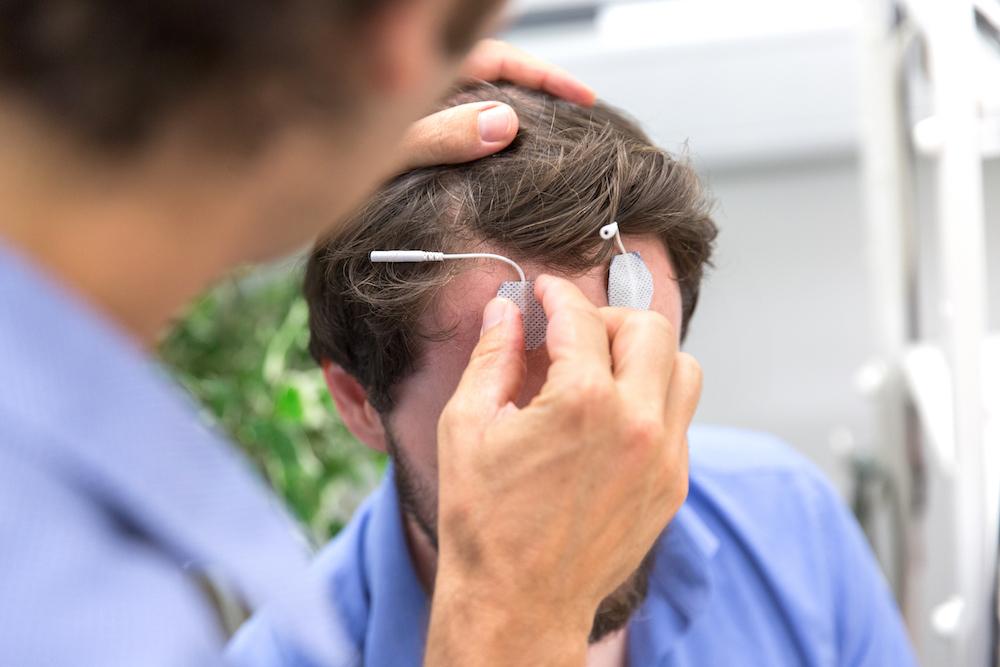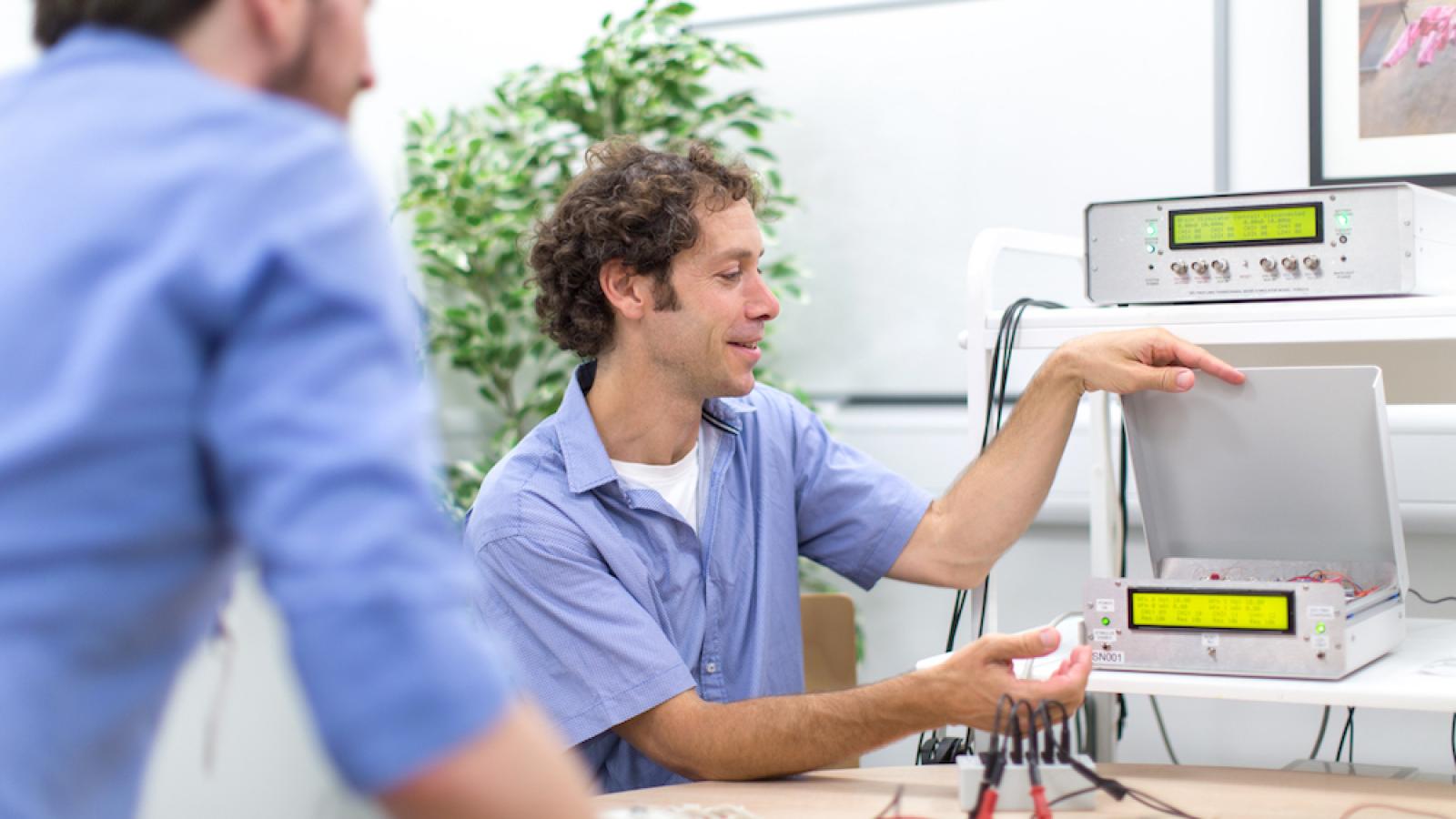A team of researchers, led by Group Leader Dr Nir Grossman, UK DRI at Imperial, has been awarded $1.5 million by the USA-based Alzheimer's Association’s Part the Cloud fund, to accelerate the application of a new non-invasive deep brain stimulation therapy for people with Alzheimer’s disease.
One of the central features of early Alzheimer’s disease is impaired bioenergetic and metabolic function in the mitochondria of cells in the hippocampus, a part of the brain associated with learning, emotions and the formation of new memories. The new method developed by Dr Grossman’s team – temporal interference brain stimulation – aims to boost these critical functions in the brain, just as exercise does in muscles. The approach targets areas deep in the brain, such as the hippocampus, without the need for surgery.
awarded to accelerate the application of a new non-invasive deep brain stimulation therapy for people with Alzheimer’s disease
This is an important milestone for us, concluding years of work on a breakthrough technological development, and testing in animals and healthy humans.Dr Nir GrossmanGroup Leader from UK DRI at Imperial
Temporal interference brain stimulation involves applying separate electric fields to the scalp, which then cross at a chosen point deep within the brain, causing the stimulation. Dr Grossman was awarded the 2018 Science & PINS Prize for Neuromodulation for developing the method and describing how it could help people with neurological conditions. Evidence suggests that electrical currents can alter the activity of targeted regions of the brain and help alleviate symptoms of some chronic conditions, but previous methods using surgically implanted electrodes are invasive and carry risks.

On receiving the award, Dr Nir Grossman said:
“We are very excited about this unique opportunity. There is more and more evidence that mitochondrial dysfunction in deep brain structures plays an important role in the early degeneration seen in people with Alzheimer’s disease. We know, however, that neuronal mitochondria are highly dynamic and tightly coupled to the activity of the cells. This Part the Cloud award from the Alzheimer's Association and Bill Gates will allow us for the first time to directly test whether we can use temporal interference to revive mitochondrial function in the most affected regions of the brain.
This is an important milestone for us, concluding years of work on a breakthrough technological development, and testing in animals and healthy humans. I would like to thank my team for their hard work, in particular Dr Ines Violante and Ms Kety Alania for spearheading the trial in healthy humans, and the UK DRI which has supported our work from a very early stage. We are fully committed to working with our funders to pioneer new treatment strategies to transform the lives of people with dementia.”

The study will be co-led by Dr Grossman, Dr Chris Butler at Imperial College, UK DRI Centre Director Prof Paul Matthews from the UK DRI at Imperial, and Dr Eugenii A. (Ilan) Rabiner, Executive Vice President of Invicro LLC. They will use the award to lead an early phase clinical trial in people with early-stage Alzheimer’s disease, testing the safety and feasibility of using temporal interference, and assessing with PET and fMRI brain imaging. The study will be conducted at the Invicro Clinical Imaging Centre and the National Institute of Health Research (NIHR) Clinical Research Facility at Imperial College London.
Prof Paul Matthews, Centre Director at UK DRI at Imperial, commented:
“This study brings cutting edge technologies for brain stimulation and advanced brain imaging together to test an exciting new concept for the treatment of Alzheimer’s disease. The study leads efforts by the UK DRI at Imperial College London to rapidly translate new science for the benefit of people with dementia. I hope that our work will provide further hope to the many who are feeling the impact of this terrible disease.”
The award is part of a partnership between Bill Gates and the Alzheimer’s Association’s Part the Cloud initiative, which funds high-risk, high-reward research that explores specific areas of neurodegeneration that contribute to the development of Alzheimer's disease and dementia, and accelerates those findings from the laboratory, through trials, into possible therapies.
Dr Eugenii Rabiner, Invicro EVP for Translational Applications, commented:
“This is a novel approach to the treatment of neurodegenerative disorders. The Invicro-led MIND MAPS programme has characterised [18F]BCPP-EF as a novel molecular imaging tool to evaluate mitochondrial status in neurodegeneration, and will be applied here to characterise the effects of deep-brain stimulation. Invicro and Imperial College London will extend their long-standing and extremely fruitful collaboration to advance the understanding of neurodegenerative disorders and develop new treatments for the many who are affected by these conditions”.
Article published: 25 August 2020
Image credits: Thomas Angus, Imperial College London
In these images Dr Nir Grossman demonstrates his brain stimulation work with Ryan 0'Hare from Research Communications at Imperial College London.
